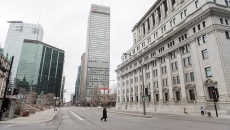Canada's rules for detaining foreigners who can't be deported quickly are constitutional, the Federal Court of Appeal has found, rejecting an argument there should be time limits for detention in immigration cases like there are for criminal trials.
In a decision released this week, the Appeal Court upheld a lower court ruling to dismiss the constitutional challenge filed by Alvin Brown, a man who was detained for five years in Canada before being deported to Jamaica.
Brown, who has schizophrenia, was stripped of his permanent residency after a series of largely drug- and weapons-related convictions, and was ordered detained pending removal in 2011 because he was deemed both a danger to the public and a flight risk.
However, Jamaica long refused to issue travel documents, so Brown remained in an Ontario correctional facility until the fall of 2016, when he was deported.
In their appeal, his lawyers argued the immigration detention regime violates several sections of the Canadian Charter of Rights and Freedoms, including those related to life, liberty and security of the person and the right not to be arbitrarily detained.
Among other arguments, they invoked the 2016 Supreme Court of Canada ruling known as the Jordan decision, which set strict time limits for criminal trials, and called for similar, judicially mandated caps on the length of detention in immigration cases.
Brown's lawyers argued the appropriate maximum limit in detention should be six months, while the advocacy group End Immigration Detention Network, which intervened in the case, argued it should be three months, court documents say.
The Appeal Court rejected those arguments, saying the considerations that prompted the Supreme Court to establish those guidelines for the criminal justice system "contrast markedly with those surrounding immigration detention."
"Together, the federal and provincial governments have complete control over almost every aspect of the criminal justice system and the variables that affect delay," including the construction of courtrooms and the appointment of judges, Justice Donald J. Rennie wrote on behalf of the three-judge panel.
"In contrast, while removal is one of the objectives of detention, Canada does not have complete control over its realization. Removal may be frustrated by political turmoil in the receiving state. Removal may be delayed by a dearth of evidence as to identity.... Travel documents must be obtained from a great number and diversity of countries, some of which may not be in a hurry to have a particular national returned."
The Jordan decision does not alter the findings of an earlier Supreme Court ruling that stated extended periods of immigration detention don't violate the charter as long as there are regular reviews of the reasons for detention, the delay in deportation, and other considerations, Rennie wrote.
That ruling "stands in the way of the appellants' argument that lengthy or indeterminate detention is per se unconstitutional," he said.
The current immigration detention scheme has "all of the protections mandated" to ensure extended periods of detention don't contravene the charter, the judge wrote.
Detention reviews are "timely and frequent," the onus is on the public safety minister to establish both grounds for detention and that detention is warranted based on case-specific factors, and detention may only be ordered when there are no appropriate alternatives, he wrote.
Brown's lawyers raised several other arguments in their appeal.
They said the immigration scheme is unconstitutional because the legislation grants discretionary power that may be exercised in an unconstitutional way. They also argued it should be impossible for the immigration division of the Immigration and Refugee Board of Canada to order detention when there is no reasonable prospect of deportation.
They also said the system places the onus on those detained to explain why they should be released, rather than on officials to justify detention.
The Appeal Court rejected those arguments as well, but said they highlight issues and legal standards that must be considered by those conducting detention reviews.
Brown previously turned to Ontario's courts in seeking damages of $1,500 for each day he had spent in immigration detention. The court dismissed his case, a decision that was upheld by the province's top court in 2018.
The Court of Appeal for Ontario said in its ruling that the five years Brown spent in maximum-security immigration custody before being deported did not amount to cruel and unusual punishment.
The Supreme Court of Canada declined to hear his case.






